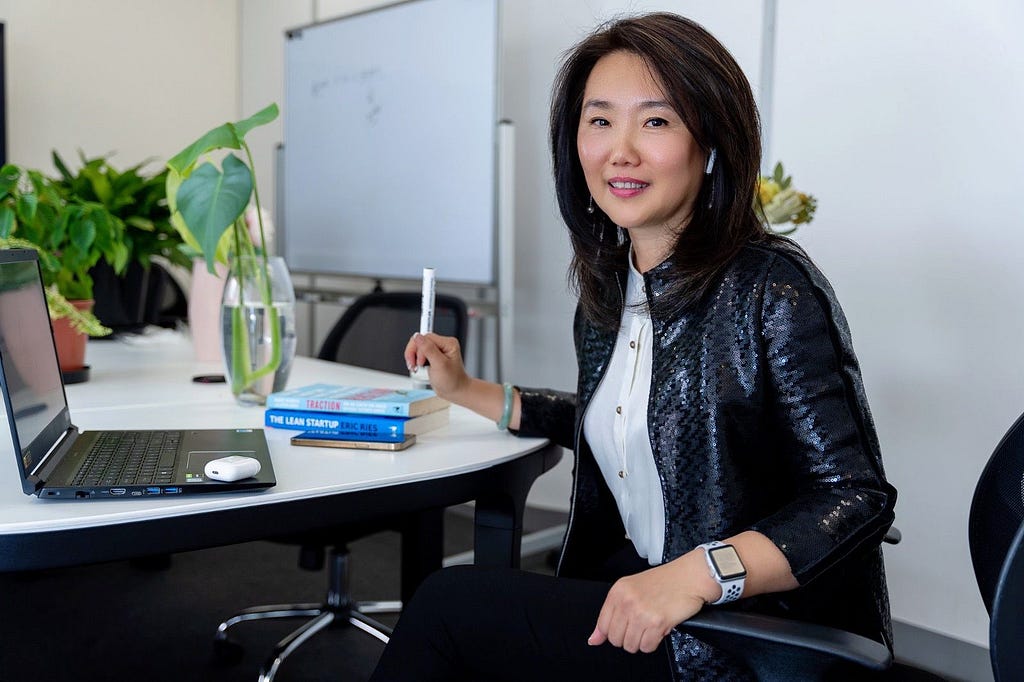Inspirational Women in STEM and Tech: Lily Li of Hygea On The 5 Leadership Lessons She Learned From Her Experience
An Interview With Candice Georgiadis

Everyone wins when leaders advocate for women to take charge of teams and departments. Women are keenly aware of their status quo. When they hear a company’s, executive say they support women climbing the ranks but see few or no women in leadership role, they assume they can’t apply for supervisory roles.
As a part of my series about “Lessons From Inspirational Women in STEM and Tech”, I had the pleasure of interviewing Lily Li.
Lily Li is the founder and CEO of Hygea, with almost two decades worth of business management, and international sales and marketing and medical experience.
Thank you so much for doing this with us! Can you tell us a story about what brought you to this specific career Path?
Prior to entering the cleaning service industry, I was working in the medical field as a doctor, and as a marketing and sales director later on. During that time, I owned a laundromat business, and that was when I got a call from a staff member who works in the cleaning service industry to come and observe how they managed a cleaning business.
My medical, marketing and sales background allowed me to see a potential business opportunity. So, I did some research, and asked some of my clients if they would be interested in my idea to which they said, yes.
My medical experience expedited the launch process, as I already knew what was expected to maintain a hygienic space, and what would be required of our cleaners to give the most satisfactory service to our clients.
After Hygea started to take off, I sold my first business in Australia. During the initial process, I worked in all departments, from distributing flyers and cleaning to marketing and management. I also joined one of my staff members on their cleaning jobs for about a month to fully understand the cleaning process, and that is when I realised how big the cleaning industry was going to grow.
The IT department and app development came on board a few years later, which elevated the business to a whole new level. It allowed us to manage more cleaning teams, and to cater to different categories of home service.
It took me years to develop the business and learn about the IT element with the little capital that I initially started with. Hygea has come a long way, and I am very proud of everything we have today.
Can you share the most interesting story that happened to you since you began at your company?
There are many interesting stories along my journey, but one of the most memorable to me was during the early stages when we began to collaborate with many developers around the world. It was then that I realised that technology has no borders — regardless of your race, nationality or culture we can pursue a dream in the same language. It was a challenge in the beginning, trying to understand IT terms while speaking with developers, but now it is something that I look forward to. This is when we come up with some great ideas.
Can you share a story about the funniest mistake you made when you were first starting? Can you tell us what the lesson you learned from that?
I think it’s funny in hindsight, but in the beginning I had trouble pronouncing some of our developers’ names, and I had no idea that I was mispronouncing them. English is not my first language and sometimes certain names are a bit tricky to pronounce and as a result some funny renditions have come up.
Sometimes people don’t want to correct you out of courtesy, but I learned that if I’m having trouble pronouncing a name, it is best to ask the person how they say it.
What do you think makes your company stand out? Can you share a story?
I think, when starting Hygea, we already had a strong client ethos from day one. Hygea’s mission was clear from the start: be a part of your family, we will always be there whenever you need our service. Even as we are evolving right now, we have always maintained the standard of service to our clients.
We also realised early on that people from different backgrounds have so many skills and ideas that they can bring to the table. We made the right decision in hiring an experienced and diverse management team. Our team comes from all kinds of professional backgrounds, from corporate banking and financial strategising to medicine and fintech.
Are you working on any exciting new projects now? How do you think that will help people?
Hygea has witnessed great growth in the past few years, and we expect to grow even more. We want to continue to upgrade and add more features to our Hygea app, catering to the needs of our clients. We would also like to create Hygea Commercial, which caters to big organisations, offices, schools, shops etc. We are looking for Hygea Commercial to collaborate with a leading blockchain Software-as-a-service (SaaS) platform.
In your opinion, what are the biggest challenges faced by women in STEM or Tech that aren’t typically faced by their male counterparts? What would you suggest to address this?
While women in STEM have made great strides in an industry that often overlooks them, I still believe that we have a long way to go. At the end of the day STEM is very much a male dominated industry still, with less than a quarter of students studying STEM being women. This means that industry operations, cultures and priorities are skewed in the favor of men.
Women are not encouraged to enter the field, often doubted from a young age about their maths and tech abilities.
I believe one of the biggest hurdles that women face in STEM is gender prejudice. Even if a woman decides to enter the field, they are met with hesitation. Men are 1.8x more likely to be hired for the same job as women. The reality is that gender discrimination and prejudice not only deter women from entering the field, but these elements also push them out if they decide to progress.
I believe that we should address that head on — structural change is essential at this point. We are on the verge of a fourth industrial revolution that will occur in the IT field, and women’s input is of extreme importance, as we cannot have a monumental structural change to our lives with only the input and view of half of society.
In order to encourage women to enter the field, there needs to be more representation. Women’s presence in STEM needs to be capitalized in order to reassure women that there is space for them.
We also need to create initiatives to make the STEM field a safe, inclusionary space that offers women equal opportunities.
Harvey Mudd College is a prime example of how changing structure and environments can result in a dramatic increase in women’s representation in computing. With leadership and college-wide support, Harvey Mudd increased the percentage of women graduating from its computing program from 12 per cent to approximately 40 per cent in five years. This was accomplished through three major changes: revising the introductory computing course and splitting it into two levels divided by experience, providing research opportunities for undergraduates after their first year in college, and taking female students to the Grace Hopper Celebration of Women in Computing conference. These changes can be modified and applied at other colleges and universities. Taken together they can reverse the downward trend in women’s representation in computing, and on a grander scale, across all STEM fields.

What are the “myths” that you would like to dispel about being a woman in STEM or Tech. Can you explain what you mean?
An ongoing myth perpetuated throughout the industry is that only men are capable of succeeding in STEM. This belief is so pervasive in the industry that it is actually becoming a deterrent to women wanting to enter the field. I am here to dispel this myth, and to say that skills and capability transcend gender/sex, as history has shown us time and time again. Women are capable, and this needs to be ingrained within educational institutions from primary and secondary to tertiary education.
What are your “5 Leadership Lessons I Learned From My Experience as a Woman in STEM or Tech” and why. (Please share a story or example for each.)
What advice would you give to other women leaders to help their team to thrive?
A woman whom I admire in this industry, Ilana Feain, has said “Equity is not the same as equality. Ego is not the same as ability. Decision is not the same as choice. EQ has a place alongside IQ in successful leadership. I have learned the hard way when and how to stand my ground, even with the good-old imposter syndrome elephant in the corner. I remind myself every day that I am here not just because of a fluke of events or some random good luck but because I actually have what it takes to leave the world a better place than I found it.”
I like this quote because it reminds me of two things. One is that to be a good leader is to inspire and guide rather than to dominate. Emotional intelligence is just as important as intellect — there are so many aspects to management that are not as obvious as delegation, for example. In order to garner good results from a team, each team member needs to feel validated and valued, and their different experiences considered when coming up with new ideas. The second thing, which I find to be pervasive for women, is managing imposter syndrome. It reminds me that I have every right to be where I am, and to take credit for my own accomplishments.
What advice would you give to other women leaders about the best way to manage a large team?
I think it is important to help women identify and hone their strengths. Women sometimes feel as if they have to pretend to be something they’re not in order to get ahead in business. Susan Lucas-Conwell, who is the global CEO for Great Place to Work, points out that this can lead them to lose sight of their inherent strengths. “Whether perceived or real, women leaders sometimes feel pressure to conform to the male leadership model, and if she bends to that pressure, she sacrifices one of her own sources of strength and personal power.”
So, I believe it’s important to acknowledge your strengths and not shy away from that.
Another thing would be to be an outspoken voice for women.
Everyone wins when leaders advocate for women to take charge of teams and departments. Women are keenly aware of their status quo. When they hear a company’s, executive say they support women climbing the ranks but see few or no women in leadership role, they assume they can’t apply for supervisory roles.
None of us is able to achieve success without some help along the way. Is there a particular person who you are grateful towards who helped get you to where you are? Can you share a story about that?
The person who supported me along my journey and helped me to get where I am today is my son Kevin. As a single mum, we have a strong bond between us — he is my strength in life. We support each other whenever we are facing difficulties. He always shares his experiences, knowledge and provides me with useful advice throughout my entrepreneurial journey. He is my motivation to keep on learning.
As a single mother, I think it’s important to chase you dream, but it’s meaningful to share your dream with your children.
I was dreaming about being a successful business woman, but more importantly, I wanted to be a good mum. I shared my dream with my son when he was little, and that became the trigger that led him to explore the business field. He started to explore multiple areas including Information technology, artificial intelligence, etc. Through his exploration, he found his own passion too.
I was really pleased with my son’s achievement. He told me that all the exploration and hard work that he is doing is to help me achieve my dream. I’m very thankful that I’m blessed with my son, and I want to share what I learnt with all parents in the world: share your dream with your children, you are the first and the most important teacher for your children, they will learn from your dream and discover their own path to the happy life they dreamed of.
How have you used your success to bring goodness to the world?
I think Hygea has a lot to offer, this service is for everyone. It provides relief, a helping hand when things get too busy. As a doctor, I can rest assured that the service provides clients with the highest degree of hygiene and cleanliness. When cleaning properties, we use the latest technology and true and tested cleaning methods that would ensure the best for the household.
As a single mother, I realise that no one can do everything, everyone needs help every once in a while.
Hygea is all about supporting and helping people.
You are a person of enormous influence. If you could inspire a movement that would bring the most amount of good to the most amount of people, what would that be? You never know what your idea can trigger. 🙂
I think it’s not so much a movement, but a mindset set that helped me step out of my comfort zone. I believe that it would inspire people to achieve their goals too. My life philosophy is no one can limit you but yourself. People are multifaceted beings that can be and do different things, and we should not be limited by choosing one path for ourselves. Being a CEO does not limit who I am, and how I define myself beyond that. The reason why Hygea came to be, was because I decided to leave my comfort zone.
I grew up in an environment where my family was mostly in the medical field. We talked about the same topics every day, and I felt that I was limited in a small circle, confined in a box. So, I decided to leave my high position job in China, and to migrate to Australia, and venture into a whole new industry.
Don’t be afraid that doing so can separate you from your family. I believe that achieving your dreams and maintaining a good relationship with your family can coexist if you manage your time between the two. I always set priority on things that I need to accomplish; plan my schedule all the time; make time for my family, especially my son even though I’m busy; share with my family about my issue, ask them for opinion; I share my dream with my family and we set goals together.

Can you please give us your favourite “Life Lesson Quote”? Can you share how that was relevant to you in your life?
There are many quotes that I live by that always remind me to never be afraid of pursuing my dreams.
One that resonates with me a lot is “no matter where you are, what stages of life you are in, don’t forget your first dream. If there is any opportunity to pursue your dreams, go for it”.
Having advanced greatly in the medical field did not stop me changing lanes, and pursuing something different. I think it’s important to remember that it’s never too late, there is not a timeline set up for everybody. You can do whatever you desire, as long as you have a clear vision and the dedication to see it through.
One that I like to tell myself all the time however, is “BE PATIENT” — everything comes in due time.
We are very blessed that very prominent leaders read this column. Is there a person in the world, or in the US with whom you would love to have a private breakfast or lunch, and why? He or she might just see this if we tag them 🙂
Oh my goddess … that’s an exciting question.
I would say Tesla’s CEO Elon Musk. It is another dream of mine to have breakfast with him one day, if only once. He is inspirational, and I admire that he never limits himself, and that he tries to do the impossible.
At this time last year, I visited Tesla’s head office in San Francisco, USA. I saw the entire automatic process of the production line of automobile manufacturing. I was truly amazed.
Thank you for these fantastic insights. We greatly appreciate the time you spent on this.
Inspirational Women in STEM and Tech: Lily Li of Hygea On The 5 Leadership Lessons She Learned From… was originally published in Authority Magazine on Medium, where people are continuing the conversation by highlighting and responding to this story.

